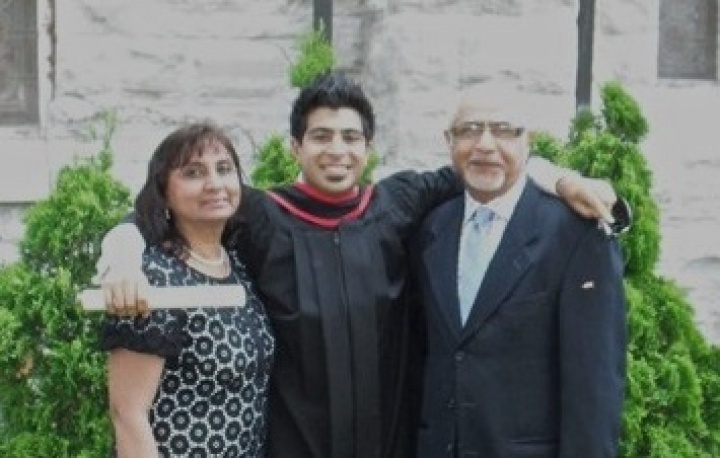
My story: Shezan Muhammedi
Published onBy Shezan Muhammedi
When was the last time you sat down with one of your parents and asked them about their childhood? Asked them about what their favourite game as a child was to play? Or how often they actually did their homework? Or what their hometown was like? If you’ve never had the chance, ask them! You never know what you’re going to learn about your parents’ history.
Recently, I sat down with my mom and did just that. Like many Canadians, we can trace back our ancestry to when our family immigrated to this country. My mother came to Canada as a refugee from Uganda in the early 1970s. She was originally born in a small village just outside of Mbarara in Western Uganda. She is the eldest of three children and was most certainly the jewel of my grandfather’s eye. Being the only daughter, she held many responsibilities of looking after her two younger brothers but also the spoils of special treatment from her dad. Unfortunately, her father passed away when she was only nine years old and she was now expected to help her mother with the family business. Throughout most of her upbringing, she was the go-to person in the house for extra help. She walked her brothers to school, made sure they were all fed when they came home, and helped her mom in the store after dinner all while pursuing her own education. On the homework front, she had very little time to study when she came home after working in the store and taking care of household chores. Looks like all those years of harassing me to do my homework were a little hypocritical!
It was in August of 1972 that her world would be turned upside down. The President and Military General of Uganda at the time, Idi Amin, had ordered the expulsion of over 80,000 Ugandans of South Asian decent. He had accused them of economic sabotage and a failure to integrate socially with black Ugandans. He argued that they had milked the cow but had failed to feed it. Ultimately, he gave my mother and her entire family just 90 days to leave the country with all but one suitcase each and no money. Due to the expulsion decree and Idi Amin’s dream, my mother’s family came to Canada in October of 1972. The partnership between Prime Minister Pierre Elliot Trudeau and the Aga Khan led to the resettlement of almost 8,000 Ugandan Asian refugees by the end of 1974.
My mother recalls coming to Canada with very little but was fortunate to get a job interview at CIBC the day after she arrived. After successfully landing the job she attempted to get to work the next day. Unfortunately, she got lost and arrived three hours late. Wearing nothing more than a regular t-shirt and flip-flops she was frozen to her very core. Considering Uganda is located on the equator, you can only imagine how cold Ottawa in November must feel! At this point the entire ordeal of leaving her life in Uganda behind and coming to a foreign country hit her square in the face. She broke down and burst into tears. Fortunately, her manager could sympathize with her and told her to spend the day getting acquainted with the staff and the office. The next day when she arrived to work on time, she was greeted by her co-workers, who had organized a used winter clothing drive for her and her entire family. She can’t help but crack a smile when she retells me this story nearly 40 years later. This was the welcome that Canada had given her when she was just 19 years old.
It wasn’t all sunshine and lollipops for my mom when she first arrived. There were some difficulties and tensions regarding the fact that Ottawa was not nearly as diverse as it is today. She remembers the looks and odd comments she received on local transit or at work. But, she also remembers how once the hesitation subsided and people got to know her and learn more about her background things really started to turn around. She proudly recalls, how at first, when she was a teller, her line was always the shortest at the bank because some people were more hesitant to interact with her. However, as soon as they realized that she was the fastest teller and had a knack for memorizing each customer’s account number to save time, her line became the longest.
After 38 years of employment at the bank and establishing her own family in Canada my mother has officially accepted a well-deserved retirement. Over the years she’s been involved in countless volunteer initiatives including the World Partnership Walk and several projects within the community. Her resilience and strength have always inspired me as she not only came to this country with nothing and helped raise her two younger brothers, she also managed to do one heck of a job on her own three boys. Trust me when I say we weren’t the easiest group of hell raisers to look after! All in all, she’s thankful everything this country has had to offer and is very proud to call herself Canadian.
That was her story of growing up in Uganda, being a refugee, and becoming an active member of Canadian society. What’s your parents’ story?
Shezan Muhammedi is a PhD student at Western University.
Reprinted with permission from: Flight and Freedom: Stories of Escape to Canada, by Ratna Omidvar and Dana Wagner (forthcoming Fall 2015)






